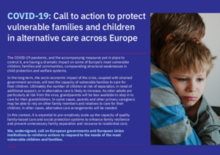The COVID-19 pandemic, and the accompanying measures put in place to control it, are having a dramatic impact on some of Europe’s most vulnerable children, families and communities, compounding structural weaknesses in child protection and welfare systems.
In the long-term, the socio-economic impact of the crisis, coupled with strained government services, will test the capacity of vulnerable families to care for their children. Ultimately the number of children at risk of separation, in need of additional support, or in alternative care is likely to increase. As older adults are particularly at risk from the virus, grandparents will be less available to step in to care for their grandchildren. In some cases, parents and other primary caregivers may be able to rely on other family members and relatives to care for their children; in other cases, alternative care arrangements will be needed.
In this context, it is essential to preemptively scale up the capacity of quality family-based care and social protection systems to enhance family resilience and prevent unnecessary family separation and recourse to residential care.
This call to action, endorsed by several organizations, calls on European governments and European Union institutions to reinforce actions to respond to the needs of the most vulnerable children and families. It outlines the main challenges for vulnerable children and families, and what the EU and European governments can do to address these challenges.

